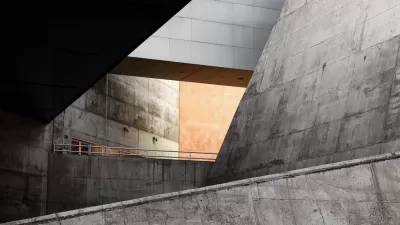Let’s face it, we all get into planning ruts. A public meeting gone awry, a discontented client, a community that just doesn’t get it. I like to call it planning fatigue, and up until a month ago, I was headed down that path. But a meeting of the minds which converged in my hometown, Miami, brought me a little closer to god, the planning god, that is. Joe Riley, the mild mannered and poignant mayor of Charleston brought me to planning euphoria. If you’ve heard him speak, then you know what I mean. If you haven’t, well let me bring you up to speed.
Let's face it, we all get into planning ruts. A public meeting gone awry, a discontented client, a community that just doesn't get it. I like to call it planning fatigue, and up until a month ago, I was headed down that path. But a meeting of the minds which converged in my hometown, Miami, brought me a little closer to god, the planning god, that is. Joe Riley, the mild mannered and poignant mayor of Charleston brought me to planning euphoria. If you've heard him speak, then you know what I mean. If you haven't, well let me bring you up to speed.
We all know how wonderful Charleston, South Carolina is. What we don't know is how much of this is dependent on continuous and constant investment and care. Which brings me to the purpose of this article. Great cities don't just happen. They are the result of vision, leadership, and perseverance. Mayor Riley was invited to Miami to speak before business types and city advocates on the topic of making Miami a world class city. Helping him out were former Pittsburgh Mayor Tom Murphy and University of Pennsylvania City and Regional Planning Professor Eugenie Birch.
Now this was embarrassing. Sitting in a generic and windowless hotel ballroom in a concrete bunker which appeared to have landed on the street from outer space, we listened to our planning god's words-- "There are no excuses to build UGLY buildings". He continued, "every street should be beautiful for the people who live there. Even people who don't have much still have the beauty of their surroundings." And finally, "every downtown is a place of value because it is for the public." This is all common sense, right? But somewhere between university graduation and today, we've lost this sense. Political obstacles and financial hurdles have muddied our ability to advocate for great cities. But these are poor excuses. As planners, we must be leaders and make good choices for our cities. Which leads me to Mayor Riley's next point: "Make no mistakes".
I cringed to think of the myriad mistakes that we've made in our City-making redevelopment decisions based on available cheap land, funding monumental public buildings by starchitects which lack basic connectivity to the surrounding fabric, missed opportunities for viable transit, a downtown scarred by ubiquitous highway ramps and overpasses and monster trucks en route to the Port, and a waterfront metropolis with pitifully few public access points to the water. It's no wonder it took only one evening in Downtown Miami for Mayor Riley, Mayor Murphy, and Dr. Birch to point out these obvious flaws.
1. Give people the finest land, not the cheapest.
2. Bring the water to the community.
3. Every detail is important.
4. Create a vision, first.
5. Make pedestrian movement natural.
6. Knit the edges of each neighborhood together andconnect fragmented pieces.
7. Don't forget about basic housekeeping and maintenance.
8. Maximize the natural assets.
9. Think regionally.
10. And above all else, build beauty into everything.
The good news is we haven't completely botched up our City. As our residential population grows and our public schools, colleges, and universities continue to produce talented and highly educated students, the demand for greatness and beauty will increase. The expectation for quality will be undeniable and our leaders will no longer rebuff the needs of our community. Mayor Riley explained that a small group of people can make change and, in a world of few heroes, Mayor Riley is certainly one that we can believe in. Armed with a solid vision for our downtown, grassroots community support, and leadership, Miami has the opportunity to finally be World Class.

Maui's Vacation Rental Debate Turns Ugly
Verbal attacks, misinformation campaigns and fistfights plague a high-stakes debate to convert thousands of vacation rentals into long-term housing.

Planetizen Federal Action Tracker
A weekly monitor of how Trump’s orders and actions are impacting planners and planning in America.

San Francisco Suspends Traffic Calming Amidst Record Deaths
Citing “a challenging fiscal landscape,” the city will cease the program on the heels of 42 traffic deaths, including 24 pedestrians.

Defunct Pittsburgh Power Plant to Become Residential Tower
A decommissioned steam heat plant will be redeveloped into almost 100 affordable housing units.

Trump Prompts Restructuring of Transportation Research Board in “Unprecedented Overreach”
The TRB has eliminated more than half of its committees including those focused on climate, equity, and cities.

Amtrak Rolls Out New Orleans to Alabama “Mardi Gras” Train
The new service will operate morning and evening departures between Mobile and New Orleans.
Urban Design for Planners 1: Software Tools
This six-course series explores essential urban design concepts using open source software and equips planners with the tools they need to participate fully in the urban design process.
Planning for Universal Design
Learn the tools for implementing Universal Design in planning regulations.
Heyer Gruel & Associates PA
JM Goldson LLC
Custer County Colorado
City of Camden Redevelopment Agency
City of Astoria
Transportation Research & Education Center (TREC) at Portland State University
Jefferson Parish Government
Camden Redevelopment Agency
City of Claremont






























